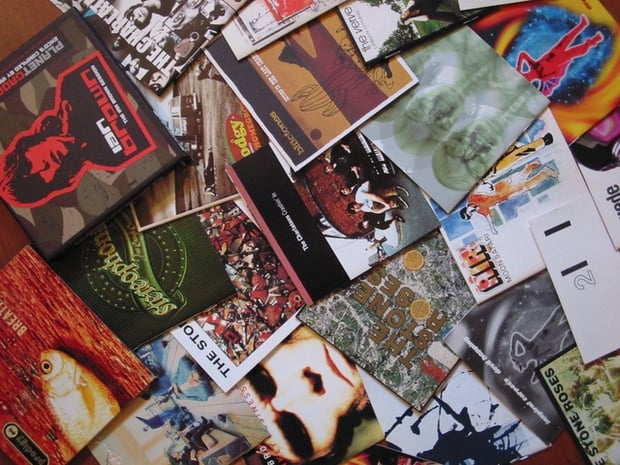 Image via freeimages.com
Image via freeimages.com
Musicians seem to have a lot of confusion as to what artwork can and cannot be used on album covers, and also who owns album artwork. In this article, I will cover the most common sources of album artwork and how that artwork is owned. For the sake of convenience, I will refer to both artwork and photographs as the "work" or "works."
1. You created the work
In this case, you would likely create a piece of art and or take a photograph that you use on the album cover. Barring any unusual circumstances, you should own and have the rights to use artwork you created or photographs you took.
If you're part of a band, it gets a little more complicated because you must note which member of the band created the work, and what the agreement is within the band as to how the work will be owned. A particular band member may retain ownership of the work as an individual and license the rights to the work to the band, or may assign ownership of the work to the band so that the band owns the rights.
If more than one member of the band created the work, they may be able to sign a simple artwork ownership agreement, but again, it still needs to be determined whether those members will retain ownership of the work or assign ownership to the bands as an entity. A band owning the work created by a single member or multiple members may be determined on a case-by-case basis, or it might be based on a band agreement.
[How to Create a Band Agreement (And Why You Need One ASAP)]
2. Someone else created the work for you
Usually this scenario plays out in one of two ways: either someone is hired by you or your band to create artwork for your album, or you hire a photographer to take photos of you or your band and then use the photograph(s) on the album.
Paying for something does not equate to ownership of it under copyright law. You may own a physical copy of the work – a photo print, a painting, a CD – but that does not automatically give you ownership rights in the copyright of the work itself. If you have hired and paid an artist or photographer to create a visual image for your album cover, that artist or photographer will still own the copyright in the work unless that creator has assigned the copyright ownership to you or your band. The assignment of copyright will often include a higher fee and/or a payment of future royalties in exchange for the creator giving up his or her intellectual property rights.
If there was no transfer of copyright and the artist or photographer retains ownership of the work, you would need to get a license from the creator to use the work for your album cover, as well as for promotional and other uses associated with the album. Again, this usually will involve a fee and/or possibly a royalty payment. Keep in mind that if the creator retains ownership, (s)he will be able to use or license the work for other purposes besides your album cover. An example of this would be the creator giving a magazine permission to use a photograph of your band that the creator photographed.
Whether working with a photographer or artist, you should get the terms of the agreement in writing. If the creator has given you a contract to sign, it would be wise to have a good music lawyer make sure the proper rights for uses related to album covers are granted in the language. If not, these rights will need to be added. If the creator retains copyright ownership, your lawyer may also be able to limit other uses granted by the creator. If the creator does not give you a contract, you should have your lawyer draft a contract so that the terms that are spelled out clearly.
3. You got the work from the internet or another source
If you purchased a stock photo on the internet, you'll need to check the license provisions that come with that photo. Some photos do not allow for commercial uses, while others do allow for commercial uses, and still others allow for commercial uses but with higher fees required. You will have to choose a photo that allows for the rights that you will need for using the photo on your album cover and associated promotional uses. Using a photo that you like from the internet without getting permission to use it is copyright infringement, even if you credit the source.
If there's a work that you like on the internet that is not from a stock photo website or that you find offline, you will need to find out the identity of the owner of the work and contact that person to get a license for permission to use that work on your album cover. Transfer of copyright ownership is probably a long shot in this scenario, but some creators might be willing to transfer ownership for the right price.
Again, consult with a good music attorney to make sure you are getting the rights you need for your specific situation.
Do you have questions that you’d like to get answered in an upcoming “Ask a Music Lawyer” article? Please send topic requests to askamusiclawyer@gmail.com. Please note that specific case advice cannot be given, and if you have questions pertaining to an issue you are personally experiencing, you should seek a consultation with a music attorney.
Disclaimer: This article is for educational and informational purposes only and not for the purpose of providing legal advice. The content contained in this article is not legal advice or a legal opinion on any specific matter or matters. This article does not constitute or create an attorney-client relationship between Erin M. Jacobson, Esq. and you or any other user. The law may vary based on the facts or particular circumstances or the law in your state. You should not rely on, act, or fail to act, upon this information without seeking the professional counsel of an attorney licensed in your state.
If this article is considered an advertisement, it is general in nature and not directed towards any particular person or entity.
Erin M. Jacobson is a practicing music attorney, experienced deal negotiator, and seasoned advisor of intellectual property rights. She protects clients ranging from Grammy and Emmy Award winners to independent artists, record labels, music publishers, and production companies. Ms. Jacobson also owns and oversees all operations for Indie Artist Resource, the independent musician’s resource for legal and business protection offering template contracts, consultations, and other services designed to meet the unique needs of independent musicians.


